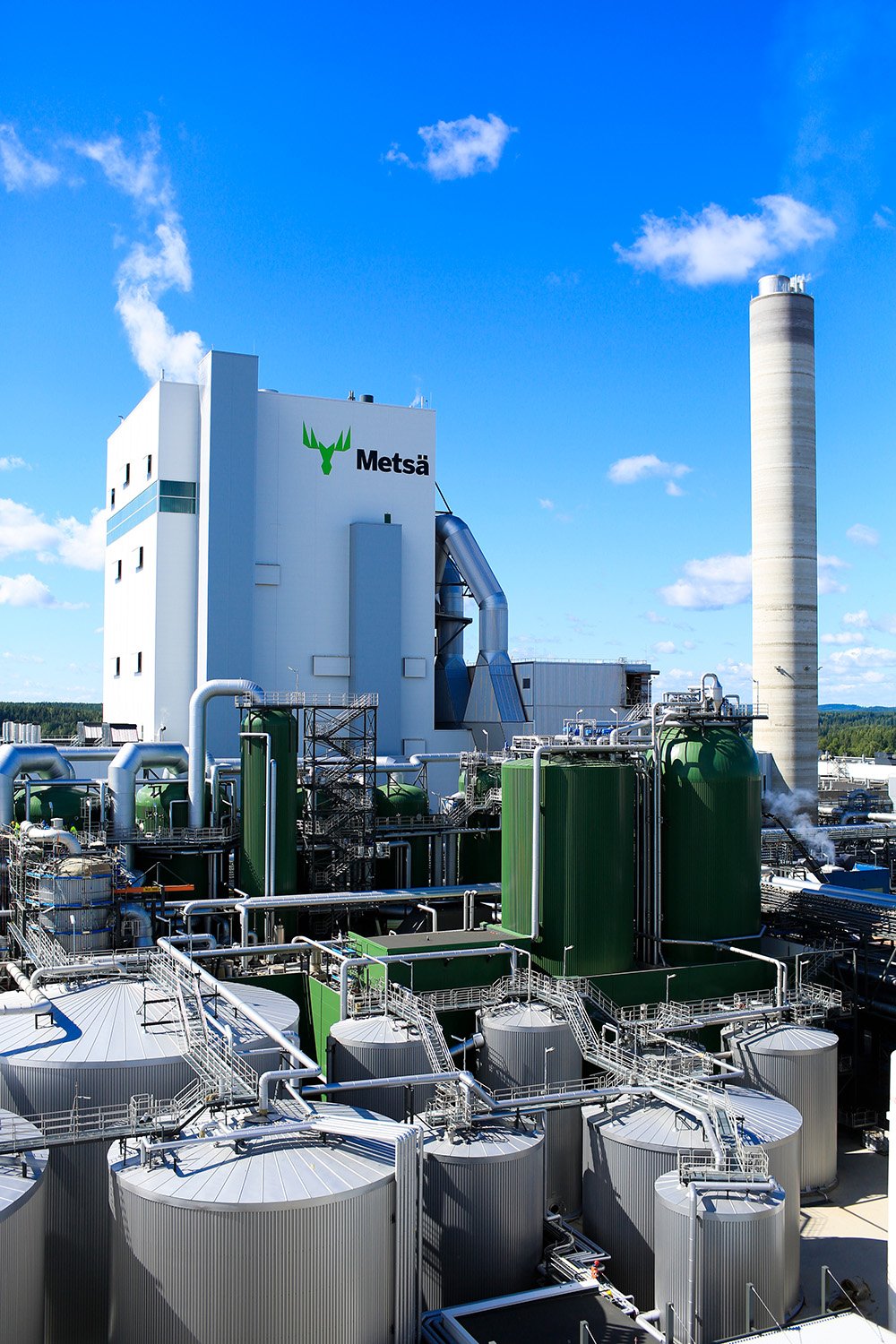Sustainability is one of the key elements of Metsä Fibre's strategy, and the bioproduct mill concept is a good example of this. It combines the efficient use of raw materials with energy efficiency and environmental efficiency.
"An extremely resource-efficient pulp mill is at the core of the bioproduct mill concept. The concept considerably increases the energy self-sufficiency of the mill and the profitability of bioproducts. Alongside traditional products, we have also developed entirely new types of bioproduct," says Jaakko Anttila, Senior Vice President, Production.
The pulp industry is based on the efficient use of renewable wood raw material and production side streams. As well as producing pulp, tall oil, turpentine and bioenergy, bioproduct mills produce new bioproducts, such as biogas and various chemicals. In addition, pulp fibre and the mill's side streams can be further processed in connection with bioproduct mills.
The Äänekoski bioproduct mill, in operation since 2017, is the world's most advanced and energy-efficient pulp mill. Its bioelectricity production is more than four times higher than that of the old pulp mill.
The bioproduct mill uses pulp production side streams to produce valuable biochemicals, bioenergy and other bioproducts. Thanks to its efficient technology, the mill generates considerably more bio-based electrical energy than it consumes. No fossil fuels are needed in pulp production. This is efficient in terms of both energy and costs.
Productivity and sustainability go hand in hand
Anttila emphasises that cost-effectiveness, productivity and sustainability go hand in hand. They can be seen as being part of Metsä Fibre's DNA. According to Anttila, sustainability is absolutely necessary for the forest industry.
"Our business operations are based on sustainable forest management. We must take care of the wellbeing and diversity of forests, in addition to ensuring that forests grow more than they are used.", Anttila says.
Environmental sustainability is reflected at all levels of operations. Anttila says that safety, environmental sustainability and efficient production – in that order – are ensured as part of day-to-day work at the mills. All mills are being continuously developed in terms of these aspects.
Metsä Fibre's goal is to be completely free from fossil fuels by 2030. Its mills already produce more bioenergy than they need, and the surplus is sold to the national grid.
Recognition for innovative work
Thanks to bioproduct mills, products made from fossil raw materials, such as plastic packaging materials and energy, can increasingly be replaced with bioproducts and bioenergy. This is also one way to reduce global warming and the plastic waste problem.
In recognition of its innovative work, the Äänekoski bioproduct mill won the international Mill of the Future Award in spring 2020. The award is granted to pulp and paper industry companies for exemplary performance. The award has great symbolic value. According to Anttila, it reminds the employees at the Äänekoski mill of the significance of their work.
"It also brings visibility to the company and the industry as a whole. We are forerunners, which is reflected in the profile of the entire forest industry." Anttila says.
Although good results have already been achieved, the principle of continuous improvement is still being followed. According to Anttila, the company is seeking to further improve its energy efficiency and productivity. For example, it is investing in processes that use water more efficiently than before in day-to-day work at the mills.
The bioproduct mill concept responds to global megatrends
Anttila believes that the secret of the success of the Äänekoski bioproduct mill lies in setting the bar very high to begin with. We aim, for instance, to meet all of our goals and for our mill to be completely free from fossil fuels.
However, the bioproduct mill is not only a regional or national concept for Finland. According to Anttila, the bioproduct mill concept responds to global megatrends, such as reducing the amount of energy generated and products produced using fossil raw materials and preventing global warming.
In the future, the bioproduct mill concept will focus on the optimal use of the potential of side streams generated in production processes. Currently, the pulp mill produces biogas, sulphuric acid and fuel pellets, for its own use and for sale, in addition to manufacturing traditional bioproducts. In the future, the goal is to produce a more diverse range of biofuels and new textile fibres.
Anttila believes that other sectors can also benefit from the concept of a self-sufficient bioproduct mill.


